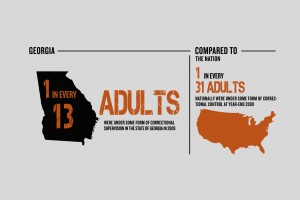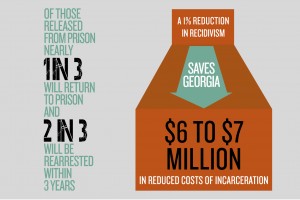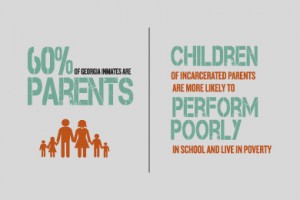by Georgia Center for Opportunity | Nov 12, 2014

Professional License Restrictions
Those who have “been convicted of any felony or of any crime involving moral turpitude in the courts of this state or any other state, territory, or country” are subject to having their application denied on account of their conviction.[i] This restriction severely curtails the number of professions available to people coming out of prison, many of which offer considerable promise for returning citizens given the vocational training they received in prison.
As it stands now, nearly 80 professions are off-limits to those with a felony conviction, including becoming a barber, cosmetologist, electrical contractor, plumber, conditioned air contractor, auctioneer, utility contractor, registered trade sanitarian, and scrap metal processor, among others.[ii]
Lift Restrictions and Open-Up Job Opportunities
In order to open-up a greater range of professions for returning citizens, the state of Georgia should lift blanket restrictions on professional licenses. Some of the professions most suitable to returning citizens’ skillsets are currently inaccessible to them because they are barred from acquiring a license in those professions. These blanket restrictions should be replaced with reasonable criteria for determining whether a given profession is suitable for a person given his or her criminal history.
As is the case for determining whether any particular job is suitable for a person given his or her felony conviction, professional licensing boards should consider the following factors in determining whether the granting of a license is appropriate:
- The nature of the crime committed and its relation to the license sought
- The time elapsed since the crime
- The applicant’s age at the time of the crime
- The evidence that the applicant has been rehabilitated[iii]
By using these criteria, professional licensing boards can eliminate unreasonable licensing restrictions while ensuring that public safety is protected. A person might be restricted from obtaining a license in one profession due to the nature of his or her crime, but prove to be an excellent candidate for receiving a license in numerous other professions where his or her crime is unrelated. These decisions must always be determined on a case-by-case basis, just as they are for applicants without a felony conviction.
A Look at Other States
Many states are already working toward increasing opportunities for those with felony convictions to obtain professional licenses. Currently, “21 states have standards that require a ‘direct,’ ‘rational,’ or ‘reasonable’ relationship between the license sought and the applicant’s criminal history to justify the agency’s denial of a license.”[iv]
- Colorado law mandates that a felony conviction or other offense involving “moral turpitude” cannot, in and of itself, prevent a person from applying for and receiving an occupational license.[v]
- New Mexico only allows occupational licensing authorities to disqualify applicants from felony or misdemeanor convictions involving “moral turpitude” if they are directly related to the position or license sought.[vi]
- Connecticut requires a state agency to first consider the relationship between the offense and the job, the applicant’s post-conviction rehabilitation, and the time elapsed since conviction and release before determining a person is not suitable for a license.[vii]
- Louisiana forbids licensing agencies from disqualifying a person from obtaining a license or practicing a trade solely because of a prior criminal record, unless the conviction directly relates to the specific occupation. In the event the applicant is denied because of a conviction, the reason for the decision must be made explicit in writing.[viii]
Conclusion
Enabling people with felony convictions to acquire professional licenses in Georgia would benefit a variety of stakeholders. Not only would it give returning citizens greater access to a variety of occupations and enable them to support themselves and their families, it would also make the most of current job-training programs offered in state prisons, create opportunities for expansion and partnership with technical schools, and enable offenders to maximize their time in prison and develop transferable job skills. Together, these advantages would work to reduce recidivism, utilize taxpayer dollars more efficiently, and promote public safety in Georgia.
Image credit: Wrightsville Beach Plumbing (featured image) and Mahanomi Health and Beauty Care Info
[i] O.C.G.A. § 43-1-19; italics added.
[ii] O.C.G.A. §§ 43-1 to 43-51.
[iii] Legal Action Center, “Recommended Key Provisions,” para. 6, https://www.lac.org/toolkits/standards/ Key%20Provisions%20-%20Standards.pdf.
[iv] Legal Action Center, “Standards for Hiring People with Criminal Records,” Advocacy Toolkits to Combat Legal Barriers Facing Individuals with Criminal Records, accessed November 29, 2013, para. 8, https://www.lac.org/toolkits/standards/standards.htm.
[v] Colo. Rev. Stat. § 24-5-101; Legal Action Center, “Overview of State Laws that Ban Discrimination by Employers,” 2, https://www.lac.org/toolkits/standards/Fourteen_State_Laws.pdf.
[vi] Legal Action Center, “Overview of State Laws,” 3.
[vii] Ibid., 1.
[viii] La. Rev. Stat. § 37:2950.
This post was adapted from Georgia Center for Opportunity’s December 2013 report titled Increasing Employment Opportunities for Ex-Offenders.
by Georgia Center for Opportunity | Nov 5, 2014

Governor Nathan Deal
Georgia is receiving national attention as the state recently received four competitive federal grants from the Bureau of Justice Assistance (BJA) to implement its Prisoner Reentry Initiative (GA-PRI). Georgia is the only state to have received all four grants at one time – a testament to the smart framework that the state has developed to bring about significant reductions in recidivism.
The Governor’s Office of Transition, Support and Reentry (GOTSR) developed the GA-PRI Framework with the assistance of the Center for Justice Innovation last fall and began taking steps to implement it at five pilot sites around the state. GOTSR took these steps knowing that additional funding would be necessary to successfully carry out this initiative.
The office applied for the BJA grants around the beginning of summer with the hopes that it would receive the funding necessary to hire the right staff, provide evidence-based training and implementation, improve information sharing and measuring outcomes, and establish quality assurance mechanisms.
Jay Neal, executive director of GOTSR, explained that the office applied for the grants with the expectation that each one would fund a different component of the initiative and build on each other. This created a package deal that would enable the state to fully implement the GA-PRI framework without duplicating funds. This smart strategy appealed to BJA, who awarded the office each grant for which it applied.
The four grants that Georgia received for this initiative include:
| Smart Supervision Grant |
Department of Corrections; Governor’s Office of Transition, Support and Reentry |
$750,000 |
| Statewide Recidivism Reduction Grant |
Department of Corrections; Governor’s Office of Transition, Support and Reentry |
$3,000,000 |
| Justice Information Sharing Solutions Grant |
Criminal Justice Coordinating Council |
$498,234 |
| Justice Reinvestment: Maximizing State Reforms Grant |
Department of Corrections; Governor’s Office of Transition, Support and Reentry |
$1,750,000 |
Now that the state has received these grants, the next challenge will be to put all of its planning into action. This implementation phase will be critical to the success of prisoner reentry reform in Georgia, and the state understands that it will take collaboration among all stakeholders in the community for it to be successful, including businesses, churches, educational institutions, non-profits, and others.
GOTSR will be presenting its three year implementation strategy at the Justice Reinvestment National Summit in San Diego (November 17-19, 2014) where hundreds of people from over 30 states will be represented. These states will be looking at Georgia to see how well the state can implement its new reentry framework to reduce recidivism.
Georgia’s goal is to see a decrease in recidivism by seven percent in two years, and by 11 percent over five years.

Jay Neal, Executive Director of the Governor’s Office of Transition, Support and Reentry
The momentum for reform is strong right now in Georgia, but the true test of the state’s commitment to preparing citizens for successful reintegration will have to be seen in the coming years as the inevitable difficulties of implementation arise.
For now, the state’s leaders seem prepared to face those challenges as they arise. There is a prevailing optimism that can be heard in government boardrooms and local reentry coalitions around the state, especially as people recount the incredible progress that has been made in Georgia over the last four years in the area of criminal justice reform.
Image credit: The Atlanta Journal-Constitution (featured image), The Wall Street Journal, and The Polk Fish Wrap
by Georgia Center for Opportunity | Oct 24, 2014

Employers have a responsibility to make sure the person they hire for a position is a right fit for the job. Background checks are one important part of this process, as they help to determine whether a particular industry or position is suitable for an applicant with a certain criminal history. However, it is vital that criminal records are used properly and not discriminatorily.[i] They should not be used as a screening tool to automatically dismiss all applicants with felony convictions. Rather, they should be used in a discerning manner, causing an employer to examine whether a person’s criminal history has any relation to the position sought. If there is a strong correlation, then there may be reasonable grounds to remove the applicant from consideration. If not, the applicant deserves the same chance as any person to demonstrate his or her qualifications for a job.
What does it mean to “ban the box”?
“Banning the box” refers to removing the question about a person’s criminal history from the initial job application and postponing the question to a later point in the hiring process. This policy increases the likelihood that a person with a criminal record will get hired by giving the applicant an opportunity to demonstrate his or her qualifications for a job without automatically being screened from the hiring process.
Postponing the question of an applicant’s criminal history to a later point in the hiring process allows applicants to explain their criminal record to an employer in person. This face-to-face interaction is essential to increasing an ex-offender’s chance of becoming employed. It provides an ex-offender the opportunity to be candid about his or her past and to explain how overcoming setbacks have fashioned him or her into a qualified candidate for the position. This conversation gives an employer the chance to listen to the ex-offender’s story, relate to him or her as a person, and get a better grasp of the person’s character and strengths. By giving ex-offenders the opportunity to represent themselves in the best light and to prove how qualified they are for a position, an employer may find his or her best candidate for the job.
Who is “banning the box”?
States, counties, and cities across the nation are establishing fair hiring polices for ex-offenders by “banning the box” on applications for public employment.
As of September 2014, thirty states have a local or state-level “ban the box” fair hiring policy for public employers. Among these states, thirteen have enacted statewide fair hiring laws, and six have also extended the fair chance policy to government contractors or private employers.[ii]
Nationwide, almost seventy cities and counties – including Atlanta and Fulton County – have taken steps to remove barriers to employment for qualified workers with records, and twenty of these cities and counties have extended “ban the box” policies to government contractors or private employers.[iii]
Why should Georgia “ban the box”?
Although the Governor spoke of “banning the box” earlier this year, he has not yet issued an executive order for state employers to do so. Taking this decisive step will be important for continuing the reforms his office has worked so hard to carry out this year to improve outcomes for returning citizens.
By following the precedent set by Atlanta and Fulton County and officially embracing “ban the box” policies for state employers, the state can help more people with criminal records get good jobs for which they qualify. This, in turn, will improve their chance of successfully reintegrating into society, decrease their chance of recidivating, enable them to benefit employers, and allow them to contribute to the economy of the state.
Embracing this policy at the state level will also encourage county, city, and even private employers across Georgia to follow suit.
For proof that “ban the box” policies help people with criminal records get good jobs and benefit employers, check out Durham, NC’s success story by clicking here.
This post was adapted from Georgia Center for Opportunity’s December 2013 report titled Increasing Employment Opportunities for Ex-Offenders.
Image credit: GT L&E Blog (featured image) and Accurate Background, Inc.
[i] U.S. Equal Employment Opportunity Commission, “Consideration of Arrest and Conviction Records in Employment Decisions Under Title VII of the Civil Rights Act of 1964,” Office of Legal Counsel, April 25, 2012, accessed November 29, 2013, https://www.eeoc.gov/laws/guidance/arrest_conviction.cfm.
[ii] National Employment Law Project, Ban the Box: U.S. Cities, Counties, and States Adopt Fair Hiring Policies to Reduce Unfair Barriers to Employment of People with Criminal Records, September 2014, ii, 3, https://www.nelp.org/page/-/SCLP/Ban-the-Box.Current.pdf?nocdn=1.
[iii] Ibid., 1-2.
by Georgia Center for Opportunity | Sep 29, 2014

Every Georgian is affected by the criminal justice system in some way. Whether it is paying taxes to fund the more than a billion dollars spent on prisons each year or knowing a loved one who has spent time behind bars, the justice system is becoming an increasingly familiar issue in the lives of Georgians.
In 2009, the Pew Center on the States released a report revealing that 1 in 13 adults were under some form of correctional supervision in Georgia. This means that over half-a-million Georgians were either in jail, in prison, on parole, or on probation that year. This percentage far surpassed the national average, which was still an astonishing 1 in 31 adults under correctional supervision.
Even more staggering, 2.6 million people have a criminal record on file with the Georgia Crime Information Center, while the state’s total population is 10 million people. The collateral consequences associated with having a criminal record mean that as many as 1 in 4 Georgians likely face barriers to obtaining employment, housing, and even voting.
Currently, 53,000 people are incarcerated in Georgia, giving the state the fifth highest prison population in the nation. The incarcerated population more than doubled between 1990 and 2011, while the state’s general population increased by only half that rate during the same time period.

The Merry-Go-Round
Once a person enters the system, his or her likelihood of staying in it is fairly strong. The state releases 20,000 prisoners back into the community every year, and 2 out of 3 of those released are rearrested within three years. Nearly 1 in 3 are re-convicted within this time frame, resulting in re-incarceration.
While the state reports a recidivism rate of 30 percent over the past decade (determined by the number of offenders who are reconvicted within three years of release), the actual recidivism rate is closer to 50 percent – taking into account the number of people who commit a technical violation while on probation and parole, as well as the number of offenders who recidivate after the standard three-year time period.

The Cost
The effect of recidivism is very costly to the state: It negatively impacts public safety, results in burgeoning costs to taxpayers, and contributes to the breakdown of families.
Public Safety
Released offenders who continue to have unaddressed criminogenic (crime-producing) needs are likely to re-engage in criminal behavior and place themselves, their families, and their community at risk. Criminal behavior may arise from a substance abuse or mental health issue, from negative peer associations, from a poor family environment, from desperation caused by their inability to meet their basic needs for housing, employment, and transportation, and from a variety of other risk factors. Without addressing the underlying factors that lead returning citizens to engage in criminal behavior, the recidivism rate will continue to remain high as new crimes and technical violations of probation and parole are committed.
Taxpayers
Recidivism places a heavy burden on taxpayers. The cost to incarcerate one person for a year in Georgia is $21,000 – more than twice the amount the state spends toward educating one student for a year. This means that every cohort of released prisoners that recidivates amounts to $130 million annually, given the 30 percent recidivism rate and the 20,000 offenders released each year. Further, state expenditures on incarceration reached $1.1 billion in fiscal year 2010 – more than twice the amount spent in 1990, which was $492 million. For the amount taxpayers have spent on the prison system in recent years, the outcomes have been unacceptable.
Families
Finally, a person cycling in and out of prison creates instability in the life of his or her family. Significantly, 60 percent of inmates in Georgia are parents, and a number of these parents have been incarcerated more than once. Children of incarcerated parents are more likely to perform poorly in school, to be exposed to their parent’s substance abuse, to use drugs, to experience mental health issues, to experience domestic violence, and to live in poverty. Incarceration puts a tremendous strain on existing relationships, decreases the chances that partners will marry, transforms family roles, and often leads custodial parents to depend on public assistance. Families experience shame, anger, hurt, and despair at the incarceration of loved ones, creating inner turmoil that is often never addressed.

What Can Be Done?
Because of the enormous costs posed by incarceration and recidivism, it is essential for Georgia to promote solutions that will address underlying issues returning citizens face. This effort must take place at all points along the continuum, from the Governor’s Office down to individuals in the community.
Several areas of reform that Georgia Center for Opportunity’s Prisoner Reentry Working Group has addressed to improve reentry outcomes involve increasing employment opportunities (read report), restructuring debt, and developing the criminal justice and service provider workforce.
Employment
Employment plays a critical role in reducing offender recidivism, as it has the power to deter ex-offenders from crime and incentivize law-abiding behavior. Key barriers to employment that the working group identified include driver’s license suspensions, missing identification (i.e., Social Security cards and birth certificates), professional license restrictions, and employers’ negative perceptions.
To remove these barriers, the group recommended that the state lift suspensions on driver’s licenses for people who committed a non-driving related drug offense, offer incentives to employers to hire those with a criminal record, and have public and private employers postpone the question about an applicant’s criminal history to a later point in the interview process. Several of these recommendations were signed into law in April 2014.

Debt
Various state agencies enforcing the payment of debts and obligations without considering the needs and financial circumstance of returning citizens can lead them to recidivate. Returning citizens often carry excessive debt because of missed child support payments that accrue during their incarceration, court-imposed fees, fines, and surcharges for their offense, unpaid restitution, and the inability for them to earn money while in prison.
Several steps that the state can take to encourage returning citizens to repay this debt in a realistic manner include: Identifying offenders with child support orders upon entry to prison; providing offenders with pertinent information about their child support responsibilities; providing a grace period of 90 days upon release that gives returning citizens the opportunity to find a job and get back on their feet; and providing incentives for returning citizens to pay current obligations of child support and restitution by forgiving a portion of fines, fees, surcharges, and child support arrears owed to the state.
Workforce Development
There is an urgent need for the criminal justice workforce and community service providers to be trained in delivering evidence-based programs and practices. Without proper training and implementation, Georgia’s recidivism rate is likely to remain unchanged.
The state can better ensure successful reentry outcomes are reached by providing training and support to agencies and service professionals in the use of evidence-based practices, developing a hybrid degree program that combines criminal justice training and case management techniques, ensuring a risk/needs assessment is used and followed from entry into prison to treatment in the community, providing the workforce the ability to use graduated sanctions and incentives, and providing accountability to the workforce to ensure evidence-based practices are being used.
Conclusion
Each person involved with this reentry effort, from the governor to mentors in the community, need to put into practice what has shown to work in reducing recidivism. This effort will require education, training, resources, and coordination on all fronts, and it is one that should be pursued with fidelity. Doing so will help to bring restoration to families, build stronger communities, and ensure a more just society.

Click here to view The State of Corrections infographic
by Georgia Center for Opportunity | Jun 25, 2014
Below is a guest blog by Jesse Wiese, Policy Analyst at Justice Fellowship, the legislative advocacy arm of Prison Fellowship Ministries.

Image Credit: Molly Rowan Leach/Feverpitched. All Rights Reserved. Found at Transformation.
For decades America has taken a “tough-on-crime” approach to criminal justice. This philosophy has generated little in the way of positive results and has resulted in burgeoning state budgets, overcrowded prisons, and low success rates. States are beginning to understand that we cannot incarcerate ourselves out of the problem of crime and recidivism. Fortunately, lawmakers are beginning to shift from a “tough-on-crime” approach and focus more on the science of criminology, or evidence-based-practices. This shift, however, is motivated predominantly by shrinking state budgets and the need to reduce the rising cost of corrections.
These reforms, while positive, do not go far enough. If we want to realize lasting change within the criminal justice system, we must do more than trim state budgets, institute new programs, or provide staff training — though these actions offer a good starting point. What is needed is a paradigm shift. We as a society need an altering of the lens through which we view crime, the men and women who commit it, and the victims and communities it affects. For a criminal justice system to be truly effective, it must recognize the broken moral foundations which lead to crime and provide a philosophical basis that perpetuates and restores the notions of human dignity and value.
Restorative justice addresses inefficiencies of the status quo and offers solutions that can provide lasting and refreshing change. By placing the victim at the center of the case, restorative justice places government in its rightful role as a facilitator of justice rather than a direct party. More importantly, restorative justice prioritizes victim participation, promotes offender responsibility, and cultivates community engagement. Identifying the needs and responsibilities of these three parties — victims, offenders, and community — is the fuel to realizing restorative outcomes and can be summed up in the following three questions:
First, do the victims and survivors of the criminal act have the right and opportunity to be validated and restored? Under the current system, the proper status of victims and survivors is usurped by the government’s unbalanced role of both victim and prosecutor. Restorative justice promotes the need for victims to be consistently considered throughout the criminal justice process. Although criminal acts often result in damages that can never be fully restored, victims and survivors have legal rights that should be enforced. Victims and survivors of crime may also need help regaining a sense of safety and control over their lives and assistance with damages they suffer, material or otherwise.
Second, are offenders given a fair process, proportionate and definitive punishment, and the expectation and opportunity to make amends? Restorative justice requires that the criminal justice system do more than warehouse people convicted of crimes. By holding men and women accountable for the harm they have caused to their victims and communities, the restorative justice process requires these men and women to take the necessary steps toward making amends and rebuilding trust within their communities. With the goal that those convicted of a crime are treated with dignity and fairness, restorative justice can ensure that punishments delivered will be proportional to the harm caused by the offense. Through this approach offenders are offered an opportunity for a fresh start, even if incarceration is necessary.
Third, is community safety improved and do communities play a role in restoring victims and those who have completed criminal punishment? Because crime affects communities by eroding public safety and confidence, disrupting order, and undermining common values, communities need to play an integral role in the restoration process. Additionally, communities can actively work to support victims and survivors of crime and help to facilitate the reintegration of those who have completed their criminal punishment. Government should, in turn, promote safety through proven crime reduction practices and the promotion of community education and solutions.
As a society, we have begun to consider the consequences of a “tough-on-crime” approach to criminal justice. Fortunately, there seems to be wide ranging support across both the political and religious spectrums for moving toward a system of restorative justice. However, the much-needed restorative justice reforms will only take place if citizens like you and me speak up, join together, and advocate for change.
You can do so by joining the Justice Fellowship Network. You will be kept up-to-date about reforms that advance restorative justice principles in your state and given opportunities to advocate for those reforms.
by Georgia Center for Opportunity | Jun 6, 2014

Prison is not typically the place where men openly share their feelings with each other, for fear of coming across as soft. However, several GCO team members experienced something markedly different while sitting-in on a fatherhood class at Clayton County Transitional Center.[i]
Reflecting on this experience, Breakthrough Fellow Michael Schulte writes:
It was wonderful to see the men open up as they spoke about their children, sharing their names, ages, and where they live now. One man had been away from his two kids for 14 years, and I could see by looking at his face how much it pained him. Many of these men are hopeful for the chance to simply be around their children again.
The fatherhood class is run by It Takes a Village Today (ITAVT), a non-profit whose name is derived from an ancient African proverb emphasizing community responsibility in the upbringing of children. As such, its mission is to preserve children and ensure they have a good upbringing through instilling the values of fatherhood within the men who will be returning to their families from prison.
The class provides a number of important services to the men including offering instruction on what it means to be a good father, helping noncustodial parents identify existing child support orders, and providing assistance in legitimizing children.
Concerning legitimation, Breakthrough Fellow Aundrea Gregg writes:
I was quite astounded by the number of men with unknown numbers of kids – men in need of help discovering once and for all who belongs to them. For fathers hopeful to build stronger relationships with their children, uncertainty of paternity can have serious implications…Any man wishing to gain rights to custody, visitation, or even have their children take their last name must complete the legitimation process…It Takes a Village…provide[s] the legal support that is needed for participants of the program to take paternity tests, file voluntary parental acknowledgement forms, and complete the legitimation process.
In addition to providing practical help, the class offers a forum for the men to speak openly about their children, share their goals as fathers, and reflect upon their own upbringing. Katherine Greene, Program Specialist with GCO, was particularly impacted as the men reflected on what sort of fathers they had while growing up. She explains:
One of the facilitators…asked two thought provoking questions: ‘What was your father like and how do you compare to him?’ Most of their responses surprised me. Many of them described their fathers as being positive role models in their lives. In the words of one inmate, ‘My father was a loving man. He was protective and very strict. He was present in my life. I just made some bad decisions which landed me in here.’ His words, among others who shared that day, really resonated with me.
Each of the GCO team members in attendance left the class feeling privileged to have learned about the men’s lives and were moved by the experience. Patrick Kaiser, Senior Manager of Research and Development, summed up the visit in the following words:
I think everyone should have a similar experience to see that these men are not like criminals portrayed in the media. Rather, they are men who have faced daunting challenges in their lives, made mistakes in how they tackled these challenges, and are looking to make amends for their errors and become positive community members. Many of these men were failed by their communities as children and young adults. We must not fail them again.
[i] Offenders entering transitional centers in Georgia typically have 6-12 months remaining in their sentence.











